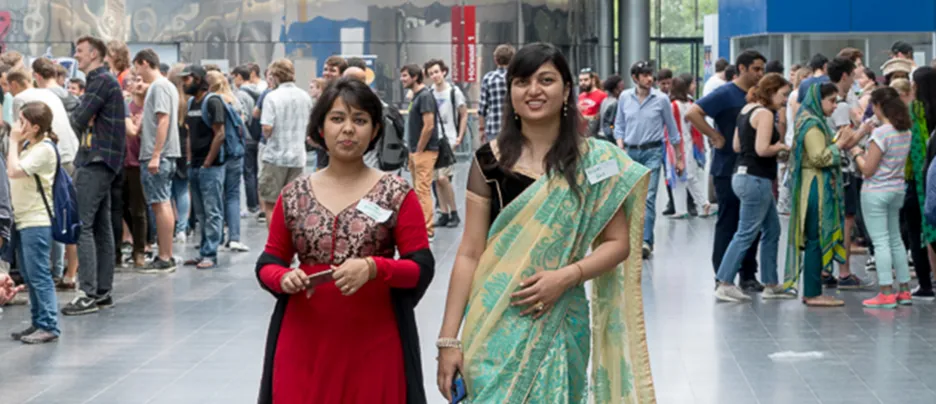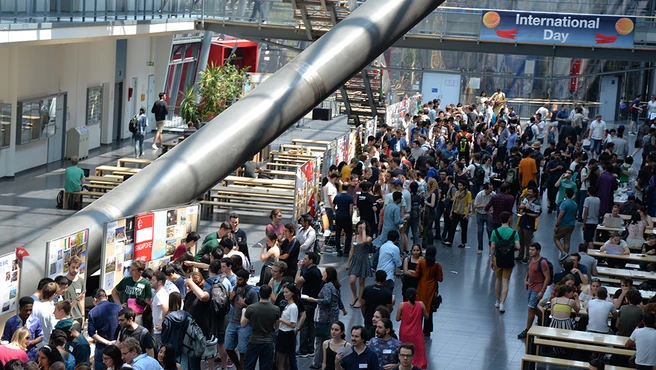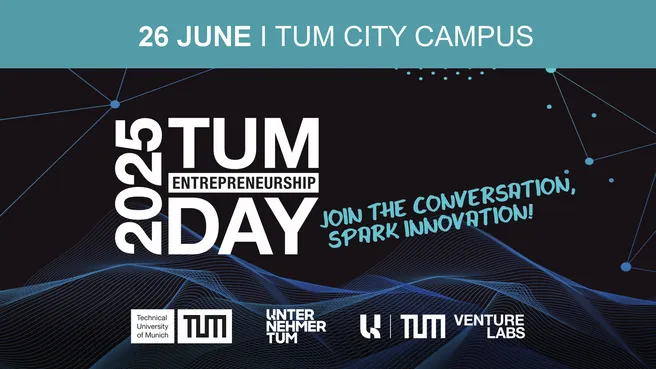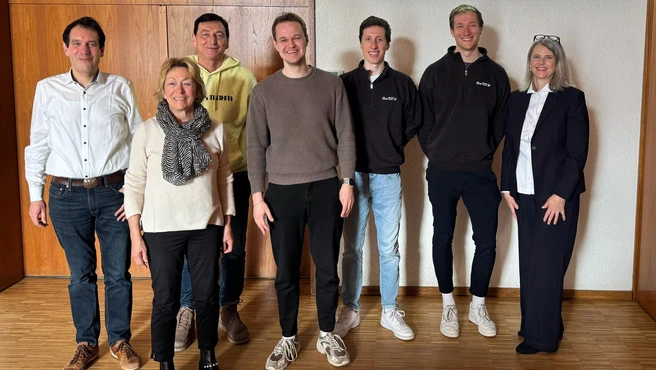You are studying at one of our partner universities and would like to spend one or two exchange semesters with us in mathematics? With one of the largest mathematics departments in Germany, the TUM School of Computation, Information and Technology offers you a wide range of professionally challenging courses in English every semester. From Algebra and Analysis to Probability Theory and Statistics to Scientific Computing, Optimization and Data Science: We cover many mathematical application areas. In addition, you may take up to 40 percent of your courses in other disciplines.
Immerse yourself in an international academic environment and expand your intercultural competence in addition to your professional knowledge. We advise you individually on your course selection and look forward to the personal contact with you!
As the TUM does not accept applications from "freemovers", international exchange students (Erasmus, TUMexchange, bilateral partnerships etc.) must fulfill two requirements in order to participate in an exchange program with the Department of Mathematics:
1st requirement: exchange agreement
Your home university has an exchange agreement with the Technical University of Munich. All our partner universities can be found in the Exchange Database of the International Center.
2nd requirement: nomination
Your home university has selected you for exchange studies at the TUM and nominated you.
Applications from exchange students
If both requirements above are fulfilled, then you can apply to the TUM. Information on the application procedure is available from the TUM Global & Alumni Office.
As soon as your home university has selected you to study at the TUM for one or two terms, you must compile a learning agreement or study plan for your application to the TUM. Here are some things you need to know:
Where do I find the courses and seminars available?
Generally, all courses and seminars which take place at the TUM can be found in the Campus Management System TUMonline. Without prior registration, you can filter out lists of courses in your chosen department and then view the module handbook for detailed information on the course content, structure, credits (ECTS), recommended prior knowledge, hours and frequency.
How do I choose the courses for the Learning Agreement?
The courses at the Department of Mathematics that will actually take place during your exchange term are generally confirmed only 4 to 6 weeks prior to the beginning of the term. Therefore, you should choose courses for your application that are offered on a regular basis. Please make use of our Guideline for Choosing Courses. Here we also provide a list of regularly offered courses.
Please note that only Master courses and advanced Bachelor courses (third year) are taught in English. The fundamental Bachelor courses (first and second year) and their practice groups are held solely in German.
What should I look for when choosing a course?
A minimum of 60 percent of subject courses must be mathematics courses (preceded by the code MA... or CIT41... or CIT51...). The other 40 percent of your courses can be chosen from the programs of other departments. Language courses do not count into this ratio.
Can I change my choice of courses?
In agreement with your home university, you can change your course choice as soon as the actual course program for your exchange term is published, at the latest however two weeks after the lecture period of your exchange term has started.
At the Department of Mathematics we differentiate between three types of teaching: lectures, practice units and seminars.
Registering for lectures and practice units
It is sufficient to register at the beginning of the relevant lecture period. Please register via TUMonline
Registering for seminars, case study courses and the TUM Data Innovation Lab
As the number of participants in these modules is often limited, registration generally takes place one semester in advance. Exchange students should therefore contact the relevant lecturer directly and ask whether places are still available for the desired courses.
20 to 25 ECTS per semester
The German university system is very different to that of other countries and the teaching is on a very high subject-specific level. We therefore recommend exchange students to limit their work load to 20 to 25 ECTS per semester, language courses excluded.
Semester dates
Compared to most other countries the semester dates in Germany are shifted:
- Winter semester: October 1 to March 31
- Summer semester: April 1 to September 30
Therefore, we recommend our incoming exchange students to either stay for two semesters or for the summer semester only.
Examination dates
At the Department of Mathematics, the regular examinations take place at the end of each lecture period. The exams for the winter semester lectures take place in February. In the summer term, the examinations are held at the end of July or beginning of August. The exact semester dates can be found under examination matters.
We can only offer extra examination dates to exchange students in justified exceptional cases. We do not offer remote exams for re-exams.
Transcript of Records
A record of achievement, stating your successfully completed examinations at the TUM, can be downloaded from TUMonline, and printed for your home university after your stay. The Transcript of Records is valid without a signature.
In principle, it is possible for exchange students to write their Bachelor's or Master's thesis during their stay at the TUM School of Computation, Information and Technology. However, this depends on various factors. Therefore, we cannot give a general guarantee that the supervision of a thesis is possible for exchange students.
Planing a research thesis and finding a supervisor
If you intend to write your Bachelor's or Master's thesis during your exchange stay at the Department of Mathematics, please contact us well in advance. Like all our students, you must independently organise a suitable professor who is willing to supervise your thesis. Experience has shown that this is only possible with advance preparation and if you have studied with us for at least two semesters.
Buddy Program

Our buddy program helps you settle in the new academic environment. Please do not forget to register for this program right after the admission.
Our TUM buddies study mathematics themselves and are competent student contacts for all your questions. They not only know the lecturers but also Munich's most beautiful beer garden and they support you in settling in socially at TUM.
Language Café

The Language Café takes place in the Mathematics and Informatics building every Wednesday afternoon. Students offer their native language at several tables and talk to their fellow students in groups of 4 to 8 people. You can participate without prior registration and meet students from other departments, practice the German language, or even offer your own language table. There is also a Language Café on Wednesdays on the Munich campus.
Central Orientation Events and Social Activities
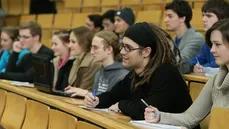
Make sure to check out the TUM events for internationals as well as the central orientation and supervision program International Campus Life for international students.
Double Degree: Your Options in Mathematics
The Department of Mathematics currently has Double Degree agreements with the EPFL (Switzerland) and the KTH Stockholm (Sweden). If you study mathematics at one of these European partner universities, then you can attain a Master's degree from the Technical University of Munich in addition to that of your home university.
Generally, those taking the double degree program spend two to three semesters at the TUM and two semesters at their home university. During this time, they attain further subject-specific and intercultural skills and finally receive two degree certificates acknowledging the achievements at both universities.
Should you be interested in the Double Degree Program with the Department of Mathematics, please contact the International Office of your home university for further information. In order to apply to the TUM, you must first be selected and nominated by your own university.
